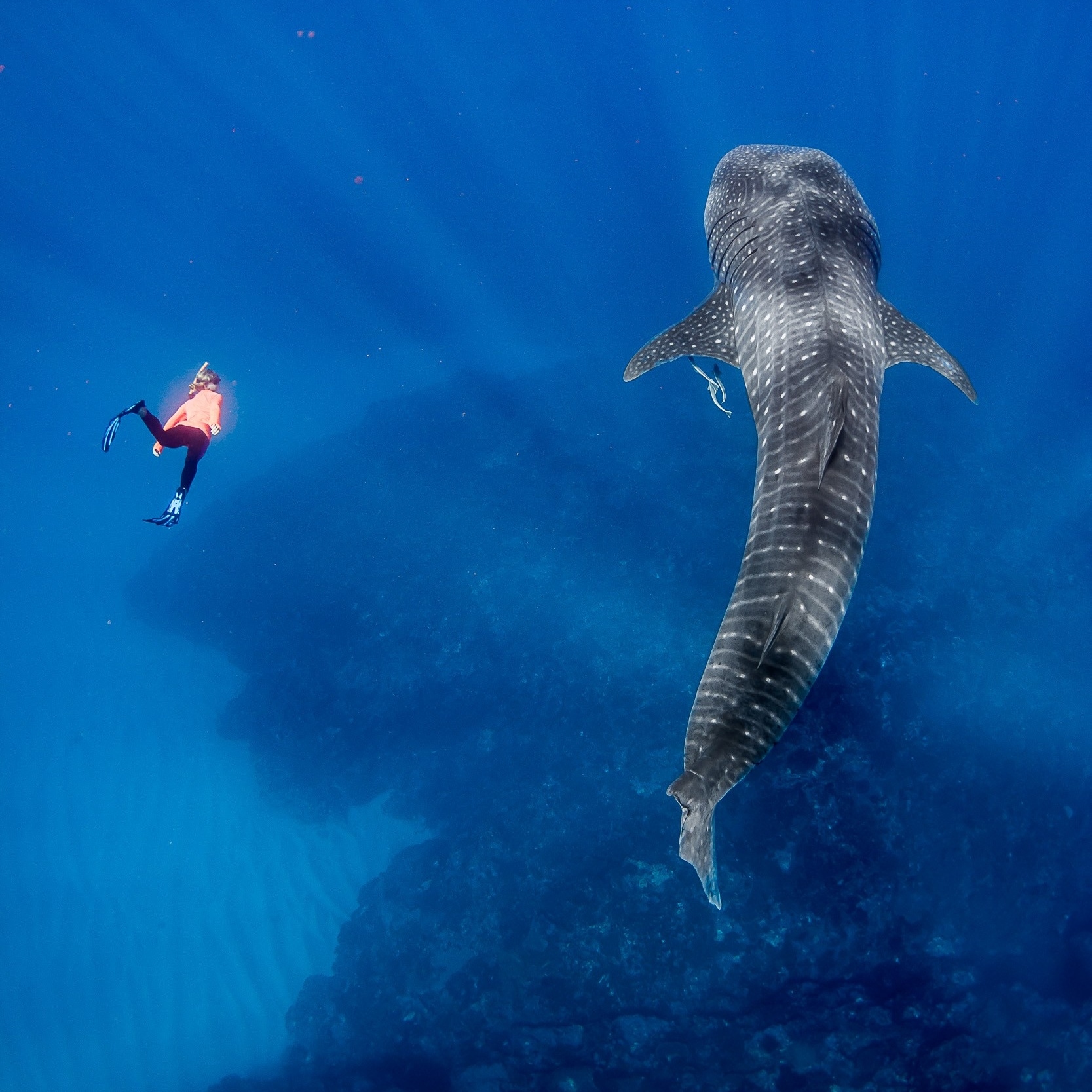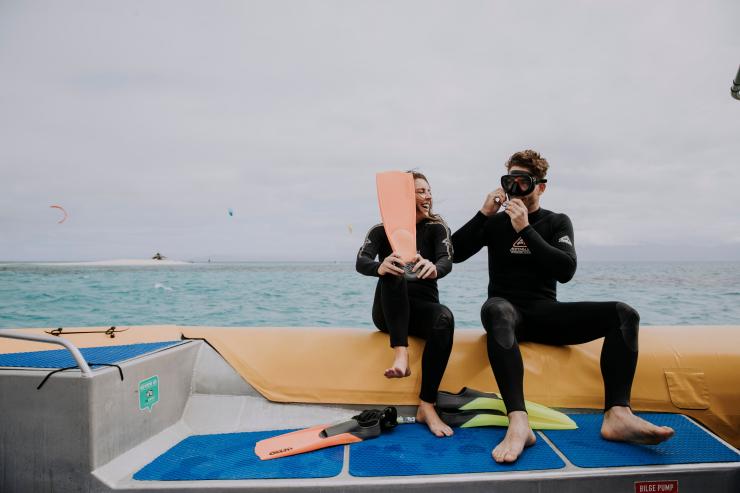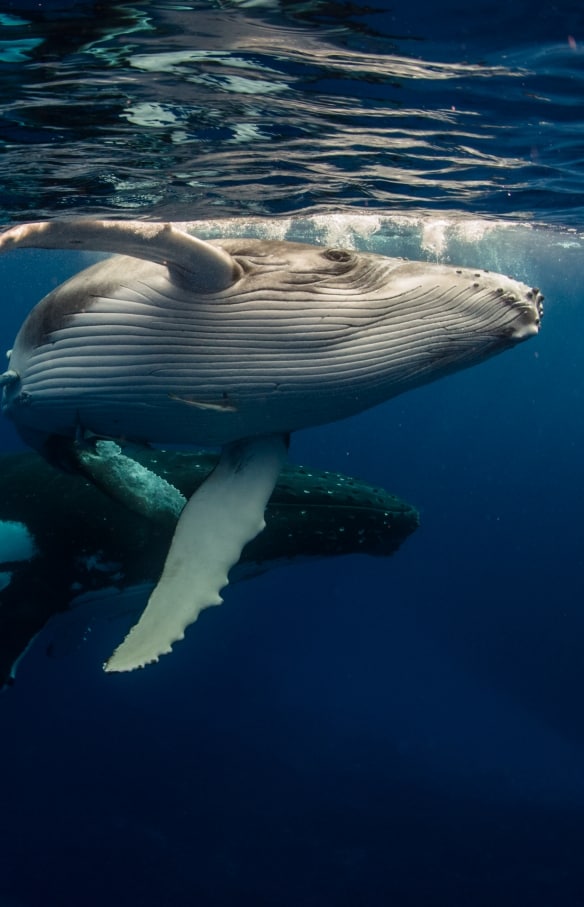
Facts about dangerous animals in Australia
Australia's animals are wild, wonderful and sometimes misunderstood. Here are the facts.
By Carolyn Beasley
Myths and urban legends have conspired against many Australian animals, giving some species an unflattering reputation. But ask any local, and you’ll hear that Australia is safe, and most of our wildlife is more scared of you than you are of it. In fact, it’s unlikely you’ll even see a dangerous animal during your visit, unless you choose one of Australia’s amazing wildlife experiences where you’ll be accompanied by an experienced and reputable tour guide. Read on as we debunk some popular Australian animal myths and provide top tips for a safe and enjoyable visit to Australia.
Will I share my surf lesson with sharks?
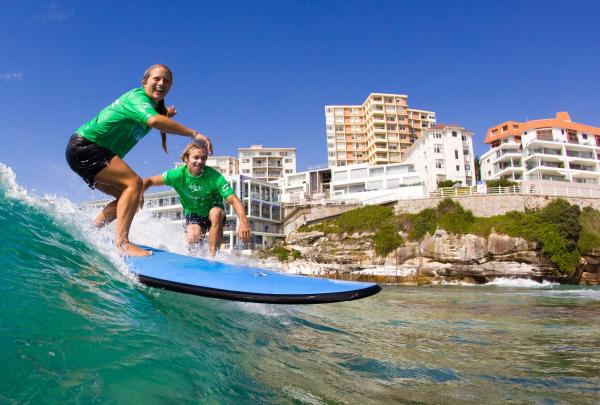
Let's Go Surfing, Bondi Beach, New South Wales @ Let's Go Surfing
From surfers carving waves to toddlers building sandcastles, being in and around the ocean is a national obsession, with millions of people swimming safely at Australia’s beaches every year. Many shark species call Australian waters home, but most are considered harmless. Occasionally dangerous species venture closer to our shores, so it still pays to take care. Look for warning signs and always swim in patrolled beaches.
Many popular beaches around the country - from Bondi and Manly in Sydney to Cottesloe in Perth – are fitted with underwater netting to deter curious sharks and several also have enclosed ocean pools that are popular for swimming. Lifeguards also monitor the waters of patrolled beaches for sharks and will blow a warning whistle to get swimmers out of the water if one is spotted.
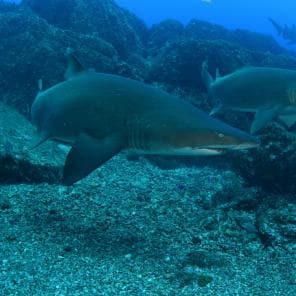
Top tip: Reduce your chances of an unfriendly shark encounter by following the same protocol recommended worldwide: avoid swimming at dusk and dawn, don’t swim where people are fishing and choose a beach that is patrolled by lifesavers and swim between the flags.
Experience it safely: Those wanting to understand these magnificent animals better can scuba dive with harmless grey nurse sharks in Byron Bay in northern New South Wales, while thrill-seekers can safely meet a wild great white shark on a cage dive in South Australia.
Will I need to worry about crocodiles?

Crocodile, Kakadu National Park, Northern Territory © Tourism Australia
Rest assured, you won’t meet a “croc” lumbering through Australian cities, as they only live in Australia’s tropical north. Saltwater crocodiles (or “salties”) may live in rivers, floodplains, freshwater billabongs and the ocean, and the smaller freshwater crocodile (“freshies”) are not considered dangerous. Local authorities remove any stray crocs from areas frequented by people and release them into their natural habitat.

Top tip: Look out for croc warning signage and don’t wade or swim in these areas. If there is no signage, play it safe and stay out of the water. But that’s not to say swimming is off-limits in Australia’s north. In Darwin, you can swim in the ocean enclosure or between the flags at patrolled beaches. And safe freshwater swimming holes abound in the Northern Territory and the Cairns and Great Barrier Reef region.
Experience it safely: Don’t miss the chance to see our impressive crocs for yourself, from the safety of a tour. Darwin is Australia’s croc capital and a day trip to the Adelaide River to see the wild “jumping crocodiles,” or a visit to Kakadu National Park, will give you a new appreciation of this ancient reptile.
Are Australia’s spiders going to attack me?

Spider, Mollymook, New South Wales @ Alex Satriani/Unsplash
Most spiders are perfectly harmless; in fact, they’re quite useful in controlling bugs. You might not even see any spiders during your visit as they’re mostly nocturnal and usually stay outside feeding on insects.
There are only two types of spiders in Australia that are potentially very dangerous. These are the funnel-web and the redback spider, but no one has died from a bite from one of these in nearly 40 years, and anti-venom is available for both species.

Top tip: Spiders will only bite if provoked. Avoid touching spider webs, and if you do see a spider, it’s best to leave it alone. If you are camping or staying in the countryside, it’s common practice to shake your shoes out before you put them on.
Experience it safely: To learn more about spiders and our diverse insects and bugs, visit the natural history museums in our capital cities. The Australian Reptile Park near Sydney offers a Venom Room Experience where you can learn about their venom-milking program that creates the anti-venom hospitals use.
Are all of Australia’s sea creatures dangerous?

Lady Elliot Island, Great Barrier Reef, Queensland @ Tourism and Events Queensland
Australia is home to some of the world’s best snorkelling and diving, and an underwater adventure is a highlight for many visitors. Venomous creatures such as stingrays, stonefish and marine snails are all perfectly safe if left alone, as none are aggressive by nature.

Top tip: Although the vast majority of our marine creatures are harmless, always follow the “no touch” rule for everything underwater. This will be safest for you and our marine creatures.
Experience it safely: Check out our amazing marine life on a snorkelling tour or sign up to be a marine biologist for a day on the Great Barrier Reef.
Will Australia’s jellyfish sting me?
Good to know
Queensland snorkelling tour operators typically supply Lycra protection suits during jellyfish season, so you can snorkel in peace year-round.


Jellyfish, Melbourne Aquarium, Melbourne, Victoria © Roberto Seba
A favourite food of Australia’s sea turtles, jellyfish play an important role in our marine ecosystem. Better yet, most of the species found in Australian waters are harmless to humans. There are a couple of jellyfish we avoid, however, including the box jellyfish and the Irukandji, which are found in northern waters typically between November and May.
On surf beaches in other parts of Australia, we occasionally find the pesky bluebottle, which resemble a mini balloon with a blue string attached. It can give an irritating sting, but it’s not dangerous. Should a bluebottle sting you, rinse the stingers away with seawater, then apply hot water. In the extremely unlikely case of a box jellyfish or Irukandji sting, rinse with vinegar and call Triple Zero (000) for an ambulance.

Top tip: In tropical areas, always swim on patrolled beaches and follow the advisory signs.
Experience it safely: To find out more about jellyfish, drop in to the outstanding Museum and Art Gallery Northern Territory in Darwin to view preserved specimens of box jellyfish.
Is Australia the most dangerous country for snakes?

Hartley's Creek Crocodile Adventures, Wangetti, Queensland © Tourism Australia
While we do have some venomous snakes, most are reclusive types that usually avoid urban areas. For example, the inland taipan, considered one of our most venomous snakes, is rare and inhabits rocky crevices in the desert. Snakes can sense vibrations from our feet and will only become aggressive if frightened or disturbed.

Top tip: Choose enclosed footwear and thick socks for hiking, and if you see a snake, back away very slowly then stamp your feet and make noise to encourage it to move along. In the extremely rare event of a snake bite, anti-venom is available to treat all dangerous snakes in Australia.
Experience it safely: You can safely view our beautiful, maligned snakes at zoos and wildlife parks around Australia.
Is it true that dingoes are very dangerous?

Dingo, K’gari, Queensland © Pirie Bath Photography
Dingoes are our native dogs. They are culturally significant to Australia’s Aboriginal and Torres Strait Islander peoples and are a protected species in many of Australia’s states and territories. They’re naturally cautious and in most places, sightings are rare. Like many animals, it is possible for dingoes to pose a threat to human safety, in particular if people feed them.

Top tips: Dingoes can be attracted to campsites by food. If you’re camping in dingo habitats, secure any food at night.
Experience it safely: One of the best places to see wild dingoes is on K’gari in south-east Queensland, the world’s largest sand island and a nature-lover’s paradise. Travelling with a guide will help you learn about dingoes in safety.
Should I wear a helmet for swooping magpies?

Magpie, Western Australia @ Chris Stenger/Unsplash
The black and white magpie is a common fixture in many Australian backyards. Occasionally, some over-protective daddy magpies are known to “swoop”, flapping around and frightening unsuspecting pedestrians.
Magpie swooping is more likely to result in surprise and laughter rather than real damage and swooping only tends to occur from August to October, during their nesting season.

Top tips: Many magpie nesting areas are signposted; be conscious of their presence and don’t approach. On the off-chance that you are “swooped”, don’t panic – distance yourself from their territory and they will stop chasing you.
Experience it safely: From birdwatching in Kakadu to witnessing the Penguin Parade on Phillip Island, there are unique opportunities for bird-lovers all around Australia.
Are quokkas dangerously cute?

Quokka, Rottnest Island, Western Australia © Tourism Australia
Even though some of our wildlife may look cuddly and non-threatening, you still need to exercise caution – even with the intoxicatingly cute creatures.
Quokkas for example – A tiny cousin of the kangaroo and known as “the world’s happiest animal” – roam free among locals on Perth’s Rottnest Island. Even though these adorable critters look friendly and will often approach humans, they are wild animals and should be treated as such.
As a general rule, avoid touching or feeding any wild animal and give extra space to a mother and her young. By keeping to these rules, you can avoid causing undue stress that may provoke an animal to scratch or bite in self-defence.
Myths aside, Australia is a safe place to visit if you follow the simple guidelines put in place, and if you’re lucky enough to spot some of our incredible wildlife, it will probably be a highlight of your trip. In the extremely unlikely event that you do need emergency assistance, call Triple Zero (000) and our authorities will be there to help you.


























































































































